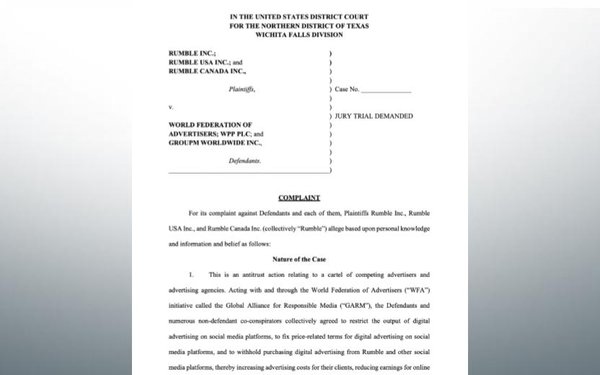
Conservative video-sharing platform Rumble is asking
a judge to allow it to proceed with claims that the World Federation of Advertisers, WPP's GroupM and spirits marketer Diageo conspired to force publishers to adhere to brand safety standards.
“Defendants agreed to enact and enforce mandatory brand safety standards that they intended to have an effect on digital advertising on user-generated platforms, with the expectation that
their conduct would impact the business operations of Texas-based user-generated platforms, advertisers, and users,” Rumble argues in papers filed Tuesday with U.S. District Court Judge Jane
Boyle in Wichita Falls, Texas.
Rumble's new papers come in a dispute dating to last August, when the company sued the World Federation of Advertisers, GroupM and Diageo for allegedly violating
antitrust law by scheming to deprive the video platform of ad revenue. Rumble brought the case the same day Elon Musk's X Corp. sued the World Federation of Advertisers, its now defunct brand safety initiative Global Alliance for Responsible Media (GARM),
and others over an alleged advertiser boycott.
advertisement
advertisement
Both suits came soon after the Republican-led House Judiciary Committee issued a report accusing GARM of coordinating action by corporations, ad
agencies and other industry groups in order to “demonetize platforms, podcasts, news outlets, and other content deemed disfavored by GARM and its members.”
Rumble alleged in its
complaint that the defendants agreed to avoid ads on platforms that don't adopt its “one-size-fits-all brand safety standards.”
The video platform claimed that it attracted new
users and content creators between 2020 and 2023, but didn't see a growth in ad revenue “commensurate to its growth in user popularity.”
In February, the World Federation of
Advertisers, GroupM and Diageo urged Boyle to throw out the complaint for several reasons -- including that Rumble's allegations regarding GroupM and Diageo, even if proven true, would only show that
the companies decided separately to refrain from placing ads on Rumble.
“The entire basis for Rumble’s claims is the assertion that defendants were part of a group boycott against
Rumble,” they argued in a motion to dismiss the lawsuit. “Yet, conspicuously absent is any allegation that defendants directly agreed to not advertise on Rumble.”
The
defendants noted in their request to dismiss the suit that Rumble -- which was founded in 2013, seven years before GARM issued its brand safety framework -- failed to allege that Diageo ever
advertised on the platform or that GroupM ever facilitated advertising on it.
“The supposed harm from the conspiracy -- Diageo and GroupM not advertising or facilitating advertising on
Rumble -- existed before, during, and after the alleged conspiracy. This strongly suggests that the decisions not to advertise on Rumble had nothing to do with the Brand Safety Framework and were
unilateral,” the defendants wrote.
They added that GARM's brand safety framework -- which they submitted to the judge in an appendix -- “does not identify Rumble (or any other
platform) as inappropriate for advertising or any brand-safety measures as being required.”
Instead, that framework “merely identifies content that is inappropriate for advertising
support (like child pornography, illegal activity, terrorism, etc.),” they argued.
They added that the framework “does not state that advertisers must adhere to the Brand Safety
Framework or boycott any platform that fails to do so,” and “does it establish any consequences if an advertiser ignores the Brand Safety Framework.”
Rumble disputes that
characterization of the framework, arguing in its new court papers that GARM's “own documents and public statements make clear that the standards were mandatory for any platform that sought to
receive advertising revenue from GARM members and that GARM members were required to adhere to the standards whenever they purchased advertising inventory.”
The World Federation of
Advertisers and others also contended that courts in Texas lack jurisdiction over the suit, arguing that none of the parties in the case are based in that state. Rumble is based in Toronto and its
U.S. division is based in Florida.
Rumble is asking Boyle to reject that argument, claiming that the alleged boycott affected Texas residents.
Established in 2019 by the World
Federation of Advertisers, GARM members included large brand advertisers and trade associations, including the U.S.'s Association of National Advertisers, American Association of Advertising
Agencies and Interactive Advertising Bureau, as well as big agencies such as Dentsu, GroupM, Havas Media, IPG, Omnicom Media Group and Publicis Media.
A spokesperson for the World Federation
of Advertisers said last year that allegations that GARM engaged in anti-competitive behavior are baseless.
“GARM creates voluntary industry standards on brand safety and suitability
which media sellers and ad tech companies can voluntarily adopt, adapt or reject,” the spokesperson said. “This in turn allows advertisers to make choices similar to the way they buy
advertising in TV, print or radio. GARM’s work focuses on voluntary monetization standards while establishing voluntary steps to improve transparency on content moderation and platform
design.”
The World Federation of Advertisers and other defendants are expected to respond to Rumble's argument by June 17.